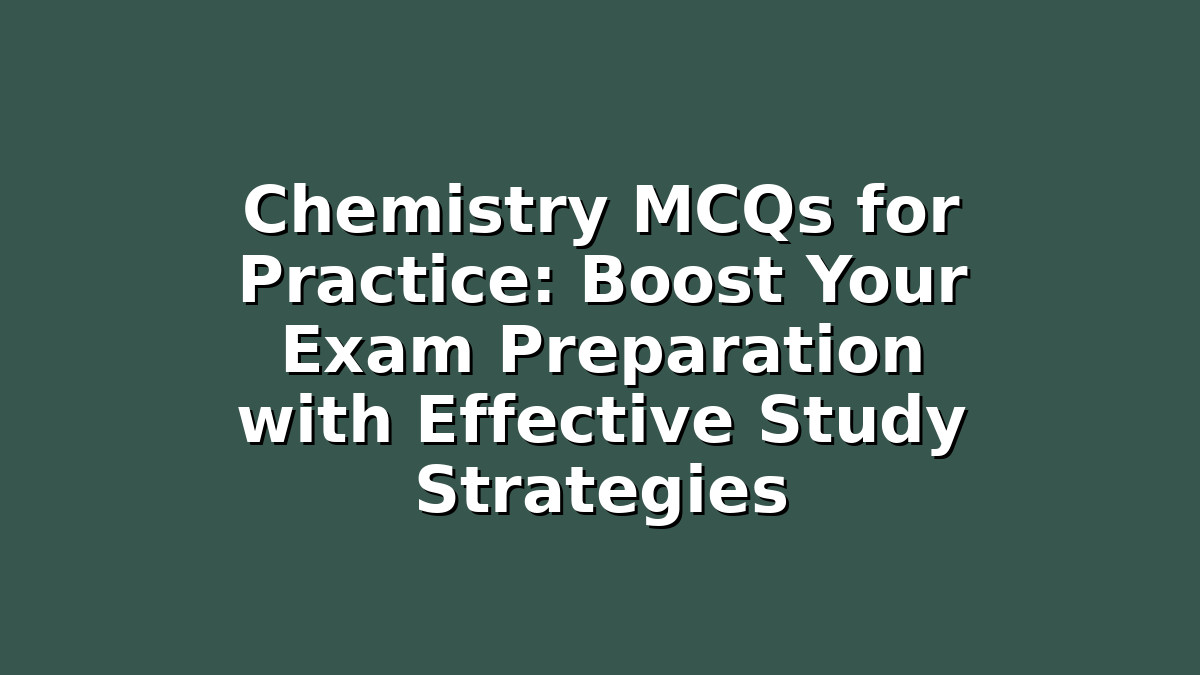Preparing for chemistry exams can sometimes feel overwhelming, especially when you’re faced with complex concepts, formulas, and reactions. However, one of the most effective ways to reinforce your understanding and improve your exam performance is by practicing multiple-choice questions (MCQs). Chemistry MCQs not only test your knowledge but also help you familiarize yourself with exam patterns, manage your time effectively, and identify areas where you need improvement.
In this article, we’ll explore the benefits of practicing chemistry MCQs and share practical study tips that will help you make the most out of your revision sessions. Whether you’re a high school student, a college undergraduate, or preparing for competitive exams, these strategies will guide you towards confident and successful exam preparation.
1. Why Practice Chemistry MCQs Regularly?
MCQs are a staple in most chemistry assessments because they can comprehensively cover a wide range of topics in a limited time. Practicing chemistry MCQs consistently offers several advantages:
– Enhances Conceptual Understanding: Chemistry involves many concepts that interrelate, such as atomic structure, chemical bonding, thermodynamics, and organic reactions. By solving MCQs, you test your grasp of these concepts repeatedly, which helps reinforce your learning and deepen your understanding.
– Improves Speed and Accuracy: Exams are time-bound, so solving MCQs regularly can improve your speed in identifying correct answers without compromising accuracy. You’ll learn to quickly eliminate incorrect options and make informed guesses when necessary.
– Identifies Weak Areas: When you practice MCQs, you naturally expose gaps in your knowledge. Keeping track of questions you find difficult allows you to revisit those topics and strengthen your understanding.
– Simulates Real Exam Conditions: Many chemistry exams include MCQs, so practicing them allows you to get used to the exam pattern and question types, which reduces anxiety and improves your confidence.
2. How to Use Chemistry MCQs Effectively in Your Study Routine
Simply attempting random MCQs won’t yield the best results unless you approach your practice strategically. Here are some tips to help you integrate MCQs into your study plan efficiently:
– Start with Topic-Wise Practice: Break down your chemistry syllabus into topics such as periodic table, chemical kinetics, acids and bases, and organic chemistry. Practice MCQs chapter-wise before attempting mixed or full-length quizzes. This approach helps you master one concept at a time and builds a solid foundation.
– Review Explanations Thoroughly: Don’t just mark answers as right or wrong; try to understand why a particular option is correct or incorrect. Most reliable MCQ resources provide detailed explanations or solutions. Reviewing these helps clarify doubts and reinforces learning.
– Set Timed Practice Sessions: Since time management is crucial during exams, simulate exam conditions by timing yourself while solving MCQs. This practice helps you become comfortable with pacing and reduces the chances of getting stuck on difficult questions.
– Maintain an Error Log: Keep a notebook or digital document where you record the MCQs you answered incorrectly or found challenging. Periodically revisit this log to focus on improving your weak areas.
– Mix Easy and Difficult Questions: To build confidence and challenge yourself, include a combination of basic and advanced-level MCQs. Gradually increasing the difficulty level helps improve problem-solving abilities.
3. Supplementary Study Tips to Maximize the Benefits of MCQ Practice
Apart from solving MCQs, incorporating these additional study tips can enhance your overall exam preparation effectiveness:
– Use Flashcards for Quick Revision: Chemistry involves many terms, definitions, and reaction mechanisms. Creating flashcards for key topics can help you review important facts alongside practicing MCQs. Apps like Anki or Quizlet can make flashcard usage more interactive and accessible.
– Group Study with Peers: Sometimes discussing MCQs with classmates helps gain new perspectives and clarify doubts. Form small study groups where you can quiz each other on difficult questions and explain concepts aloud. Teaching others is one of the best ways to reinforce your knowledge.
– Refer to Standard Textbooks and Notes: While MCQs help with practice, keep your textbooks and notes handy for deeper understanding. Use them to clarify concepts behind tricky questions or to study topics that you struggle with.
– Practice Previous Year Question Papers: Many exam boards release past papers with MCQs. Practicing these helps you get accustomed to the question style and difficulty level you can expect. It’s also a great way to track your progress over time.
– Stay Consistent and Positive: Consistency is key when preparing for chemistry exams. Even if you find certain topics difficult, don’t get discouraged. Regular, steady practice combined with a positive mindset will help you improve gradually.
Conclusion
Chemistry MCQs are an invaluable tool for students preparing for exams. They not only help reinforce your understanding of core concepts but also enhance your speed, accuracy, and confidence. By practicing MCQs regularly and combining this with smart study strategies such as topic-wise practice, reviewing explanations, timed sessions, and collaborative learning, you can significantly boost your exam readiness.
Remember, the goal isn’t just to answer questions correctly but to truly comprehend the underlying chemistry concepts. Stay consistent, keep a positive attitude, and leverage the power of chemistry MCQs to achieve your academic goals. With focused effort and the right approach, acing your chemistry exams is well within your reach!

Responses